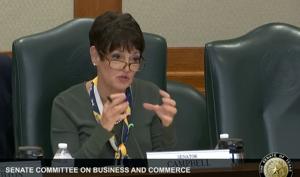(The Center Square) – A proposal by Texas Republicans mirrors a controversial one proposed by Illinois Democrats that critics argue that would force credit card users to pay sales taxes and tips in cash. If enacted, it would kill small business and jobs, disrupt multiple industries and create chaos for consumers, opponents of the measure argue.
Identical bills filed by Republican state Sen. Donna Cambell (SB 2026) and state Reps. Drew Darby, Phil King and Angie Button (HB 4124) would amend the state Business & Commerce Code to exclude state and local taxes and gratuities from certain electronic payment credit card and bank card swipe fees. They would require merchants to receive a rebate of the amount equal to the swipe fee attributable to the state or local tax and impose a fine of up to $1,000 for each violation. It also would authorize the attorney general’s office to recover a civil penalty or obtain temporary or permanent injunctions against violators. Violators would also be required to refund the merchant of any swipe fees, according to the bill language.
At a hearing, Cambell argued the bill was “really about small businesses. We’ve got big dogs, which are the banks … that bring in a lot of income. Small businesses are operating on such a small margin and I’m not sure why just taking out the tax portion is such a piece of dynamite.”
Numerous small businesses, credit unions and community banks oppose the bill; large multi-million-dollar retailers support it.
The bills threaten what sets Texas apart, a strong economy built by small businesses and entrepreneurship, opponents argue.
Nacogdoches small business and restaurant owner Donna Finley said the proposal will “threaten everything we have built …” Her business is part of the community, she says, “we’re neighbors, community members and job creators.” In addition to rising costs due to inflation, the Republican push to change how credit card transactions are processed “is a direct threat” that will “create chaos for small businesses like mine,” she says.
“My entire ordering and payment system would have to be reconfigured – an expensive and time-consuming burden for any small business,” she said. After investing thousands of dollars in her current system, which she argues “reduces fraud, streamlines service and allows customers to pay the way they want – by card,” the Republicans’ “bad policies like SB 2026 fail to consider the realities of running a small business and could harm hundreds of local restaurants, shops and service providers across Texas.”
David Williams, president of the Taxpayers Protection Alliance, agrees, arguing, “Bold entrepreneurship, limited regulation, and a firm basis in free-market principles have made Texas the global economic powerhouse it is today.” But the Republican proposal threatens this by imposing “burdensome payment processing regulations that would crush small businesses while handing big-box retailers a competitive advantage.”
Cambell’s proposal would also negatively impact community banks and credit unions; disrupting “the fair and balanced financial ecosystem by limiting credit unions’ ability to offer competitive, member-focused services,” said Caroline Ward, president/CEO of Cornerstone League, which provides products and services to credit unions.
Christopher Williston, president and CEO of the Independent Bankers Association of Texas, also notes that a similar proposal was rejected in 30 states and failed because “it is fundamentally inoperable, standing to disrupt the payment flow of every business in America,” he said. “It’s an ill-conceived money grab by big retailers who benefit from the convenience of payments and banks’ covering the cost of rampant debit/credit fraud, but don’t want to help cover the costs.”
The exception is Illinois, where the Interchange Fee Prohibition Act became law last year. It was challenged in court and last month a judge halted its enforcement, also extending protections for out-of-state banks, The Center Square reported.
The Texas Republicans’ “heavy-handed approach mirrors a failed policy from Illinois, a high-tax and high-regulation states,” Williams says.
Unlike Texas, which consistently ranks first for job creation and as the best state for business, Illinois rivals New York and California for near last place rankings every year. As Texas continues to gain new residents, businesses and jobs, Illinois residents and business owners fleeing the blue states cite a high tax and regulatory environment.
“In the Prairie State, similar legislation triggered costly taxpayer-funded litigation and created special carve-outs for out-of-state financial institutions,” Williams said. “The lawsuit raises concerns about the fundamental unfairness of this kind of legislation. Economic regulation should try to create a level playing field, not pick winners and losers in the market. There is no reason why the beacon of prosperity and freedom like Texas should want to import regulatory overreaches from poorly run states like Illinois. There is a reason blue-state residents are packing up and moving to Texas.”
Texas Republicans shouldn’t follow Illinois Democratic policy that would “penalize local businesses – the businesses of their constituents,” he argues. “This bill isn’t just bad policy; it’s a direct assault on the economic model that has delivered prosperity and opportunity to Texas. Markets and consumer choice are almost always best situated to allocate resources, set prices, and otherwise determine what the economic landscape will look like. When government picks winners and losers, taxpayers and consumers almost invariably lose.”
Both bills were heard in their respective legislative committees and have yet to be voted on by the full Senate or House.











